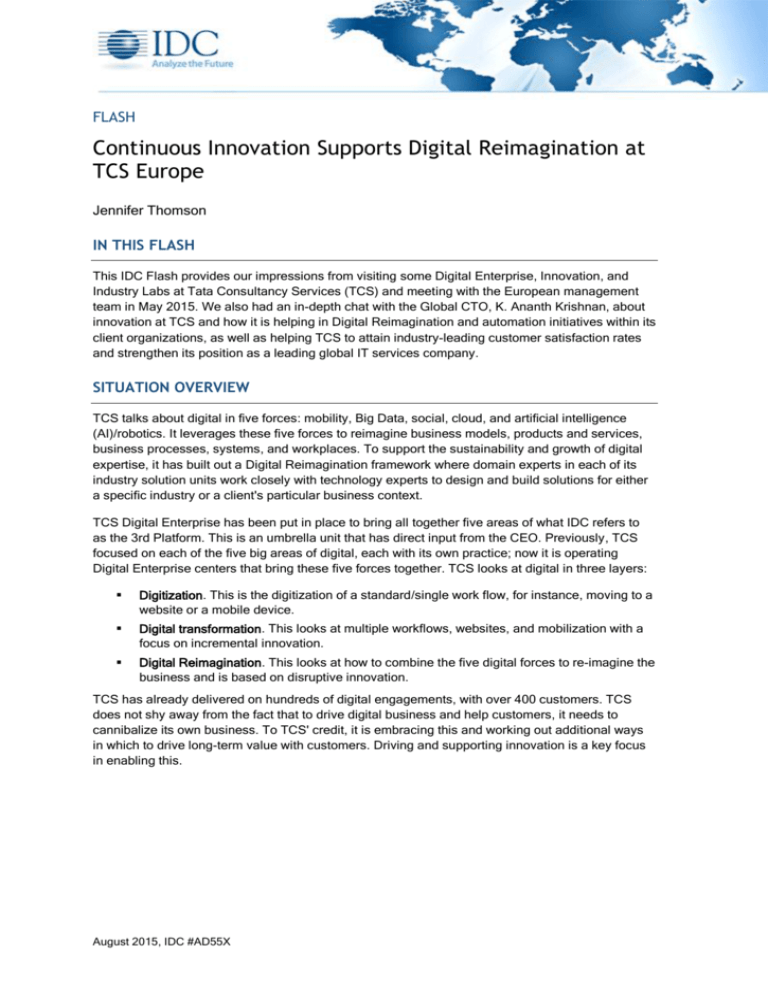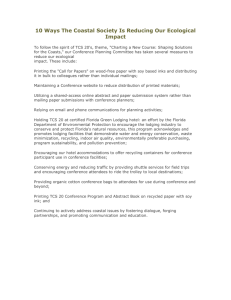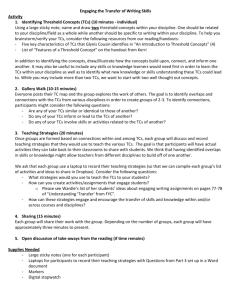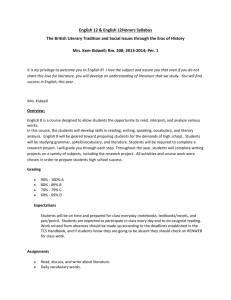
FLASH
Continuous Innovation Supports Digital Reimagination at
TCS Europe
Jennifer Thomson
IN THIS FLASH
This IDC Flash provides our impressions from visiting some Digital Enterprise, Innovation, and
Industry Labs at Tata Consultancy Services (TCS) and meeting with the European management
team in May 2015. We also had an in-depth chat with the Global CTO, K. Ananth Krishnan, about
innovation at TCS and how it is helping in Digital Reimagination and automation initiatives within its
client organizations, as well as helping TCS to attain industry-leading customer satisfaction rates
and strengthen its position as a leading global IT services company.
SITUATION OVERVIEW
TCS talks about digital in five forces: mobility, Big Data, social, cloud, and artificial intelligence
(AI)/robotics. It leverages these five forces to reimagine business models, products and services,
business processes, systems, and workplaces. To support the sustainability and growth of digital
expertise, it has built out a Digital Reimagination framework where domain experts in each of its
industry solution units work closely with technology experts to design and build solutions for either
a specific industry or a client's particular business context.
TCS Digital Enterprise has been put in place to bring all together five areas of what IDC refers to
as the 3rd Platform. This is an umbrella unit that has direct input from the CEO. Previously, TCS
focused on each of the five big areas of digital, each with its own practice; now it is operating
Digital Enterprise centers that bring these five forces together. TCS looks at digital in three layers:
Digitization. This is the digitization of a standard/single work flow, for instance, moving to a
website or a mobile device.
Digital transformation. This looks at multiple workflows, websites, and mobilization with a
focus on incremental innovation.
Digital Reimagination. This looks at how to combine the five digital forces to re-imagine the
business and is based on disruptive innovation.
TCS has already delivered on hundreds of digital engagements, with over 400 customers. TCS
does not shy away from the fact that to drive digital business and help customers, it needs to
cannibalize its own business. To TCS' credit, it is embracing this and working out additional ways
in which to drive long-term value with customers. Driving and supporting innovation is a key focus
in enabling this.
August 2015, IDC #AD55X
Innovation Defined
For TCS, innovation is central to delivering on the Digital Reimagination promise. TCS defines
innovation as follows:
Invention: Research and development (R&D) investment and IP creation. TCS has created
an inventor community through TCS Research. This community has grown substantially in
the past 10 years; we estimate from 300 to 500 resources in research (with advanced
degrees, academic careers), in combination with an additional 2,500 resources in
development, engineering, and innovation at its engineering innovation center. TCS
continually invests in intellectual property, tools, accelerators, frameworks, products, and
platforms.
Co-Innovation: Participation in open innovation networks, tracking emerging start-ups, and
incubation of ideas.
Innovation hubs: Staying in tune with innovation hubs and keeping its finger on the pulse of
the future. TCS monitors and tracks activity in London, Helsinki, Copenhagen, Berlin,
Stockholm, Boston, Toronto, Israel, and Silicon Valley.
Co-Innovation Network (COIN): TCS' Spine of Innovation
What is evident is the emphasis and effort that TCS places on building out ecosystems of
engagement. COIN, the Co-Innovation Network run by Ananth, plays a central role here. Every
year, TCS screens over 1,000 start-ups across the key innovation hubs, looking for interesting
companies at different stages of incubation. In the Nordics for example, it does this through
SLUSH. For TCS, these are not capital plays — it is not investing in equity, but time, bandwidth,
ecosystem expansion, and invention. This gives TCS and its customers a radar of what is going on
in the technology world.
At any one time, it is tracking 1,000 companies, then it will shortlist about 200 and come up with
about 20 to go into a joint go-to-market (GTM) program where TCS ultimately builds solutions to go
on top of the start-up's product. TCS ensures that the incubation group is a self-fulfilling circle —
from the 1,000 companies they are actively tracking, there are always 20 in the incubation phase.
TCS evaluates each company across a number of criteria including the concept, finances, funding,
leadership, alignment with TCS, and potential for differentiation as a game changer.
To help in the selection process of the 20 start-ups to go into a GTM incubation program, TCS
gauges interest levels from strategic customers and sets up events/Innovation Days where
customers can vote as well as work with TCS innovation teams to brainstorm business problems
and potential technology-led solutions. COIN centers of excellence have been set up in the U.K.,
Continental Europe, U.S., and Singapore, with expansion planned in Australia and China.
This joint go-to-market strategy works well for all involved, and clients are attracted by the chance
to get their hands on cutting-edge technologies that could potentially give them a competitive edge.
Over the past three to four years, TCS has been integrating customers into the COIN network.
There are two main approaches. First is what TCS terms the "tourism model," where it takes clients
to "see the sights" of key innovation hubs. Second, TCS can custom-build a COIN network for a
customer — this model is more intensive. Many customers are engaging and mentoring the
companies with TCS as the value-add partner. On the other hand, the start-ups gain access to
Fortune 500 clients and valuable references, while TCS gains access to a scalable model to gain
thought leadership, generate revenues, and build client trust.
©2015 IDC
#AD55X
2
TCS has also formed co-innovation technology partnerships — SAP, IBM, Oracle, HP, and others
are partners where strong development teams work closely with TCS. To bring ideas to fruition,
TCS has set up Innovation Labs at technology level and at industry level (e.g., HP Innovation Lab,
Retail Innovation Lab, Banking Innovation Lab, etc.). This is where it drives the conversion of ideas
to true solutions. This is a joint ownership with the CTO and the lines of business. Additionally,
TCS has an incubation group to incubate new business ideas and initiatives that TCS is not
currently engaged in at all; for example, the digital business at TCS was seeded five years ago,
and the Internet-of-Things (IoT) business was seeded in the past 18 months.
TCS is working to integrate COIN into the innovation journey and is shifting ownership to the
Innovation Labs and the business. It is also rapidly pushing and training staff on consultative
design capability aimed at solving business problems. Focus is on design thinking, and TCS is
working to scale this, with "design studios" being set up and an increasing number of partnerships
formed, for example, the recent announcement between TCS and the Royal College of Art,
London. This partnership facilitates design workshops that focus on building/designing solutions
with the customer's customers in mind. COIN provides TCS with a model to not only generate
growth, but also allows it to build trust with its clients and further establish its brand as a thought
leader.
Disruptive Platforms
Over the past few years, TCS has built and launched several platforms (cloud based) that are now
finding their feet in the market. For instance, the life insurance and pension policy administration
platform in the U.K. now has 8 million policies under administration. The overarching philosophy is
to provide the capabilities that the market needs; provide customers with resilient, robust, low-cost,
and adaptable solutions; and provide platforms for customer's customers. For example, the TCS
Digital BaNCS platform is deployed by the bank, but it is also used by the customer, therefore it
has to be very different in look, feel, and attributes to match what the consumer of the services
wants. Essentially, each platform needs to be able to scale, but it must also have a central focus on
user experience. For example, TCS was recently selected by a European airline to reimagine the
customer experience of its loyalty program.
This — along with other cloud platforms covering enterprise functions such as human resources
management (e.g., deals with Mitchells & Butlers and SABMiller), finance and accounting (e.g.,
Scandinavia Airlines deal), accounts payable, procurement, analytics, etc. — represents a business
model that bundles shared services with the shared platform, essentially delivering the entire
process from the cloud and charging the customer for the process outcome.
The platform business is a rapidly growing part of the TCS portfolio, and TCS is actively investing
in the creation of cross-industry platforms (social platforms) and cross-industry data pools
(customer loyalty, common customer insights). The future is about capturing the essence of the
shared economy, which requires flexibility in thinking. It is not just about industry process changing
the front end — it is about the reality of the shared economy and disruption/disruptive innovation as
well as the ability to leverage and understand behavioral analytics across multiple workflows (e.g.,
tied into social sites, product engineers, POS). In TCS' view, it is about the ability of applying
gamification to the whole experience instead of an incremental redesign of business processes.
Disruptive Automation
TCS is working to take its automation journey to the next level, taking advantage of the changed
economics of artificial intelligence and machine learning.
©2015 IDC
#AD55X
3
ignio: A Neural Automation Platform for Enterprises
An example of this is the recent launch of ignio, a neural automation platform for enterprises to
help customers reimagine their technology and business operations. TCS claims it possesses a
contextual awareness of the IT landscape it operates in, and it automates most of the routine tasks
that currently make up the bulk of the maintenance workload. ignio's benefits can be particularly
significant in the infrastructure services space where it is estimated that 25% of the tasks
performed by production management teams can be eliminated and over 50% of the manual tasks
performed today can be automated.
It has already had some key wins; for example, a financial institution in the U.K. chose ignio for the
blueprinting, administration, provisioning, and performance management of its IT infrastructure in a
"service as software" model. Also, a large supermarket chain in the U.K. is leveraging this for the
effective and efficient management of its IT infrastructure.
Robotics Process Automation (RPA) in Business Process Services
TCS' approach to RPA is to have the robots simply emulate human behavior without changing the
underlying process or system. It deploys non-intrusive software robots that log into client systems,
carry out the standard operating procedures, and sit on the desktop device so there is no need for
any changes to be made in client IT systems, applications, or architecture. As TCS explained, it is
a combination of implementing the "executing arms" (that see, read, search, and extract info) and
"thinking brains" (that orchestrate, learn, and make simple decisions).
TCS' R&D lab has developed dozens of robotic components such as an image parsing and
processing program, redaction tool, a sentiment analyzer, a neural search algorithm, and an event
scheduler — all of which form the backbone of its RPA approach. TCS currently manages over 10
million business process transactions a day, allowing its self-learning robotic algorithms to build
knowledge and improve every time they perform a transaction.
Traditional automation has been implemented at a task level, but RPA has the ability to handle
end-to-end processes in an integrated way using built-in artificial intelligence. This expands the
scope of RPA to processes not only in the back end, but also to cover processes that touch end
customers. RPA can be used for simple and complex data entry as well as in some judgmentbased processes like workflow management.
FUTURE OUTLOOK
There is a lot of movement in the market and changing fortunes for vendors, but overall, we believe
that TCS is well positioned to take hold of the opportunities offered in the digital space. We see it
really stepping up its game in investments, partnerships, and talent management, showing its
strong commitment to innovation and winning in the new world of services provision. We offer the
following advice:
Develop integrated solutions. Future success in digital transformation hinges on the ability
of vendors to develop and create integrated digital transformation solutions. TCS (through
its Digital Reimagination focus) is already doing this. TCS has an impressive number of
industry-specific solutions and Digital Innovation Labs that showcase its capabilities. Our
advice is to continue to drive more of the digital business to Digital Reimagination and the
provision of integrated solutions that cross the 3rd Platform. TCS is clearly building its
position in the digital space, but as competitors are moving with speed, so it should
continue to communicate successes early and demonstrate business value. Digital in
Europe is becoming a consulting play, so ensuring the visibility of capabilities is critical to
ensure the role of influencer.
©2015 IDC
#AD55X
4
Continue to leverage COIN to build ecosystems of engagement. In IDC's view, the future is
about the ability of service providers to create hybrid communities of experts, customers,
and partners to bring creative, user-centric, affordable, and quality solutions to market
faster. For us, success will increasingly be built on a company's ability to bring clusters of
"diversity" together that can be used to create the right scale, products, and quality. The
creation of ecosystems of engagement will increasingly be the norm; a vendor needs to be
able to tap into its extended network and assemble its "A" team to meet individual client
needs. The ability to bring together clusters of talent simultaneously and on demand will be
a huge advantage in meeting new digital demands. TCS gets this, and in our view, it is one
of the leaders in its ability to tap into sources of innovation and talent. The key will be to
sustain innovation and creativity at scale.
Continue to expand design-led consulting. The visibility of TCS' capability in design-led
thinking is growing, but there is still a number of enterprises that view TCS and other
technology services players as technology-led problem solvers. TCS needs to continue to
demonstrate and expand design-led business consulting expertise, proving that it is a
business-led problem solver with technology prowess.
Push the visibility of disruptive automation and RPA solutions. Solving automation and
efficiency issues across IT and business processes is a huge and ongoing challenge for
many European enterprises. TCS should help enterprises take their automation journey to
the next level — play to the synergies that will open up between IT and business process
services (BPS).
©2015 IDC
#AD55X
5
About IDC
International Data Corporation (IDC) is the premier global provider of market intelligence, advisory
services, and events for the information technology, telecommunications and consumer technology
markets. IDC helps IT professionals, business executives, and the investment community make
fact-based decisions on technology purchases and business strategy. More than 1,100 IDC
analysts provide global, regional, and local expertise on technology and industry opportunities and
trends in over 110 countries worldwide. For 50 years, IDC has provided strategic insights to help
our clients achieve their key business objectives. IDC is a subsidiary of IDG, the world's leading
technology media, research, and events company.
IDC U.K.
Chiswick Tower
389 Chiswick High Road
London W4 4AE, United Kingdom
44.208.987.7100
Twitter: @IDC
idc-insights-community.com
www.idc.com
Copyright Notice
This IDC research document was published as part of an IDC continuous intelligence service, providing
written research, analyst interactions, telebriefings, and conferences. Visit www.idc.com to learn more about
IDC subscription and consulting services. To view a list of IDC offices worldwide, visit www.idc.com/offices.
Please contact the IDC Hotline at 800.343.4952, ext. 7988 (or +1.508.988.7988) or sales@idc.com for
information on applying the price of this document toward the purchase of an IDC service or for information on
additional copies or Web rights. [trademark]
Copyright 2015 IDC. Reproduction is forbidden unless authorized. All rights reserved.







